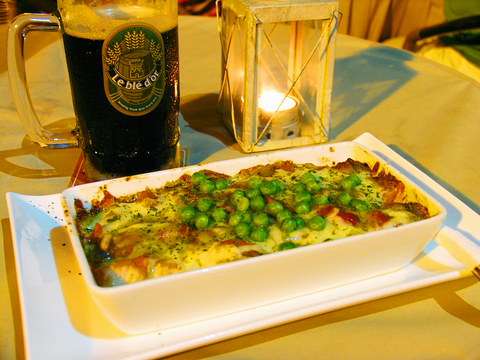Now that the government isn't the only one allowed to brew beer, there are several local startup breweries worth giving a try and others that are worth giving several tries. In the latter group is Le ble d'or, the beer garden located in the courtyard area of the Asia World shopping center.
Of course, Le ble d'or's main selling point is the three beers the company brews itself in Hshichih (
While few diners seemed interested in enjoying a meal outdoors after Le ble d'or opened last August, the place has seen a steadily increasing number of patrons willing to sample their menu of European cuisine and local favorites.

PHOTO: DAVID MOMPHARD, TAIPEI TIMES
Hungarian beef stew with rice shares the menu with a host of seafood dishes; spicy cuttlefish, seafood pizza, seafood chowder and baked mussels, to name a few. But the majority of the menu is given over to what would otherwise be considered pub grub: deep-fried chicken nuggets, nachos and the like. These are served in generous portions (and should be given the prices they carry at NT$280 for a basket of chicken nuggets or NT$250 for nachos) and help the beers go down better.
On my last visit, I had the baked Hungarian beef stew with rice. The beef was of a good quality, but there could have been more of it and the dish would have sat better atop a long-grain rice instead of the local variety. The compromise here is that the rice is prepared loose, not sticky, and soaks up more of the dish's flavor.
And if nothing on the menu tempts your taste buds, there is always the beer. Since it's prepared fresh and not pasteurized it retains more nutritional value than the regular bottled beer. Of the three varieties available, the stout is most like a meal in itself (though it's not as bitter as many European stouts). The Weissen is a personal favorite. With the sediments filtered out, it retains a cloudiness that goes quickly to your head upon drinking the 500cc-sized serving. The most popular is Le ble d'or's lager. It's the most like Taiwan Beer, but a refreshing change from the nation's flagship brew.

April 14 to April 20 In March 1947, Sising Katadrepan urged the government to drop the “high mountain people” (高山族) designation for Indigenous Taiwanese and refer to them as “Taiwan people” (台灣族). He considered the term derogatory, arguing that it made them sound like animals. The Taiwan Provincial Government agreed to stop using the term, stating that Indigenous Taiwanese suffered all sorts of discrimination and oppression under the Japanese and were forced to live in the mountains as outsiders to society. Now, under the new regime, they would be seen as equals, thus they should be henceforth

Last week, the the National Immigration Agency (NIA) told the legislature that more than 10,000 naturalized Taiwanese citizens from the People’s Republic of China (PRC) risked having their citizenship revoked if they failed to provide proof that they had renounced their Chinese household registration within the next three months. Renunciation is required under the Act Governing Relations Between the People of the Taiwan Area and the Mainland Area (臺灣地區與大陸地區人民關係條例), as amended in 2004, though it was only a legal requirement after 2000. Prior to that, it had been only an administrative requirement since the Nationality Act (國籍法) was established in

With over 80 works on display, this is Louise Bourgeois’ first solo show in Taiwan. Visitors are invited to traverse her world of love and hate, vengeance and acceptance, trauma and reconciliation. Dominating the entrance, the nine-foot-tall Crouching Spider (2003) greets visitors. The creature looms behind the glass facade, symbolic protector and gatekeeper to the intimate journey ahead. Bourgeois, best known for her giant spider sculptures, is one of the most influential artist of the twentieth century. Blending vulnerability and defiance through themes of sexuality, trauma and identity, her work reshaped the landscape of contemporary art with fearless honesty. “People are influenced by

Three big changes have transformed the landscape of Taiwan’s local patronage factions: Increasing Democratic Progressive Party (DPP) involvement, rising new factions and the Chinese Nationalist Party’s (KMT) significantly weakened control. GREEN FACTIONS It is said that “south of the Zhuoshui River (濁水溪), there is no blue-green divide,” meaning that from Yunlin County south there is no difference between KMT and DPP politicians. This is not always true, but there is more than a grain of truth to it. Traditionally, DPP factions are viewed as national entities, with their primary function to secure plum positions in the party and government. This is not unusual